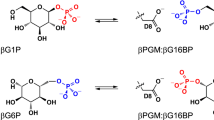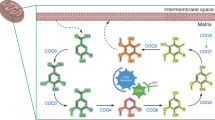Abstract
Phosphofructokinases (PFK; EC 2.7.1.11) are tetrameric enzymes that have a key role in the regulation of glycolysls1; as such, they are subject to allosteric activation and inhibition by various metabolites2. Eukaryotic PFKs are about twice the size of prokaryotic enzymes and are regulated by a wider repertoire of effectors: for example, the subunit molecular weights of rabbit muscle (RM) PFK and Bacillus stearothermophilus (Bs) PFK are 82,000 and 36,000, respectively. Both enzymes are activated by ADP (or AMP), but RM-PFK is also activated by fructose bisphosphates (FBP) and inhibited by ATP and citrate. This, together with other evidence, has led to speculation that mammalian PFKs have evolved by duplication of a prokaryotic gene3–5, although previous peptide analysis6 failed to reveal internal homology in RM-PFK. Here we demonstrate clear homology among the N- and C-halves of RM-PFK and Bs-PFK, thus establishing an evolutionary relationship by series gene duplication and divergence. Furthermore, detailed knowledge of the Bs-PFK structure provides the basis for inferences concerning the structural organization of RM-PFK and the evolution of new effector sites in the enzyme tetramer.
This is a preview of subscription content, access via your institution
Access options
Subscribe to this journal
Receive 51 print issues and online access
$199.00 per year
only $3.90 per issue
Buy this article
- Purchase on Springer Link
- Instant access to full article PDF
Prices may be subject to local taxes which are calculated during checkout
Similar content being viewed by others
References
Uyeda, K. Adv. Enzym. Related Areas molec. Biol. 48, 193–244 (1979).
Kemp, R. G. & Foe, L. G. Molec. cell. Biochem. 57, 147–154 (1983).
Paetkau, V. H., Younathan, E. S. & Lardy, H. A. J. molec. Biol. 33, 721–731 (1968).
Coffee, C. J., Aaronson, R. P. & Frieden, C. J. biol Chem. 248, 1381–1387 (1973).
Emerk, K. & Frieden, C. Archs Biochem. Biophys. 164, 233–240 (1974).
Walker, I. D., Harris, J. I., Runswick, M. J. & Hudson, P. Eur. J. Biochem. 68, 255–269 (1976).
Kolb, E., Hudson, P. J. & Harris, J. I. Eur. J. Biochem. 108, 587–597 (1980).
Fitch, W. M. J. molec. Biol. 49, 1–14 (1970).
Evans, P. R. & Hudson, P. J. Nature 279, 500–504 (1979).
Evans, P. R., Farrants, G. W. & Hudson, P. J. Phil. Trans. R. Soc. B293, 53–62 (1981).
Keim, P., Heinrikson, R. L. & Fitch, W. M. J. molec. Biol. 151, 179–197 (1981).
Rossmann, M. G., Liljas, A. Branden, C. I. & Banaszak, L. J. The Enzymes Vol. 11 (ed. Boyer, P. D.) 61–102 (Academic, New York, 1975).
Paetkau, V. & Lardy, H. A. J. biol. Chem. 242, 2035–2042 (1967).
Lad, P. M., Hill, D. E. & Hammes, G. G. Biochemistry 12, 4303–4309 (1973).
Foe, L. G., Latshaw, S. P. & Kemp, R. G. Biochemistry 22, 4601–4606 (1983).
Foe, L. G. & Trujillo, J. L. J. biol. Chem. 255, 10537–10541 (1980).
Gottschalk, M. E., Latshaw, S. P. & Kemp, R. G. Biochemistry 22, 1082–1087 (1983).
Kemp, R. G. & Krebs, E. G. Biochemistry 6, 423–434 (1967).
Hill, D. E. & Hammes, G. G. Biochemistry 14, 203–213 (1975).
Kemp, R. G., Foe, L. G., Latshaw, S. P., Poorman, R. A. & Heinrikson, R. L. J. biol. Chem. 256, 7282–7286 (1981).
Weng, L., Heinrikson, R. L. & Mansour, T. E. J. biol. Chem. 255, 1492–1496 (1980).
Author information
Authors and Affiliations
Rights and permissions
About this article
Cite this article
Poorman, R., Randolph, A., Kemp, R. et al. Evolution of phosphofructokinase—gene duplication and creation of new effector sites. Nature 309, 467–469 (1984). https://doi.org/10.1038/309467a0
Received:
Accepted:
Issue Date:
DOI: https://doi.org/10.1038/309467a0
This article is cited by
-
GFAT and PFK genes show contrasting regulation of chitin metabolism in Nilaparvata lugens
Scientific Reports (2021)
-
Analysis of the regulatory mechanism of deoxynivalenol production using omics
AMB Express (2018)
-
Effect of the cancer specific shorter form of human 6-phosphofructo-1-kinase on the metabolism of the yeast Saccharomyces cerevisiae
BMC Biotechnology (2017)
-
Sodium ions activated phosphofructokinase leading to enhanced d-lactic acid production by Sporolactobacillus inulinus using sodium hydroxide as a neutralizing agent
Applied Microbiology and Biotechnology (2017)
-
Unique PFK regulatory property from some mosquito vectors of disease, and from Drosophila melanogaster
Parasites & Vectors (2016)
Comments
By submitting a comment you agree to abide by our Terms and Community Guidelines. If you find something abusive or that does not comply with our terms or guidelines please flag it as inappropriate.



